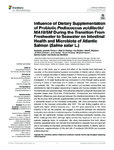Influence of Dietary Supplementation of Probiotic Pediococcus acidilactici MA18/5M During the Transition From Freshwater to Seawater on Intestinal Health and Microbiota of Atlantic Salmon (Salmo salar L.)
| dc.contributor.author | Jaramillo-Torres, A | |
| dc.contributor.author | Rawling, MD | |
| dc.contributor.author | Rodiles, A | |
| dc.contributor.author | Mikalsen, HE | |
| dc.contributor.author | Johansen, L-H | |
| dc.contributor.author | Tinsley, J | |
| dc.contributor.author | Forberg, T | |
| dc.contributor.author | Aasum, E | |
| dc.contributor.author | Castex, M | |
| dc.contributor.author | Merrifield, DL | |
| dc.date.accessioned | 2019-11-04T13:48:46Z | |
| dc.date.issued | 2019-09-27 | |
| dc.identifier.issn | 1664-302X | |
| dc.identifier.issn | 1664-302X | |
| dc.identifier.other | ARTN 2243 | |
| dc.identifier.uri | http://hdl.handle.net/10026.1/15113 | |
| dc.description.abstract |
The aim of this study was to assess the effect of the transfer from freshwater to seawater on the distal intestinal bacterial communities of Atlantic salmon (Salmo salar L.) and to evaluate the effect of dietary inclusion of Pediococcus acidilactici MA18/5M (at 1.19 × 106 CFU/g). In this context, fish health and antiviral response were also investigated. A 12-week feeding trial was conducted in a flow-through rearing system involving 6 weeks in freshwater and 6 weeks in seawater. Fish received a control and probiotic diet. The composition of the salmon gut bacterial communities was determined by high-throughput sequencing of digesta and mucosa samples from both the freshwater and seawater stage. The main phyla detected during both freshwater and seawater stages were Firmicutes, Proteobacteria, Fusobacteria, and Actinobacteria. Significant differences were observed between the intestinal microbiota in the digesta and the mucosa. Both probiotic supplementation and the seawater transfer (SWT) had a substantial impact on the microbial communities, with most pronounced changes detected in the mucosal communities after SWT. This last finding together with a significantly higher antiviral response (mx-1 and tlr3 gene expression) in the distal intestine of fish fed the probiotic diet suggest a causal link between the microbiota modulation and activation of antiviral response. Feeding probiotics during the freshwater stage did not significantly increase survival after infectious pancreatic necrosis virus (IPNV) challenge after SWT, although higher survival was observed in one out of two replicate challenge tanks. In conclusion, this study demonstrated that both dietary probiotic supplementation and transfer from freshwater to seawater have an important role in modulating the bacterial communities in the distal intestine of Atlantic salmon. Furthermore, supplementation of the diet with P. acidilactici MA18/5M can modulate antiviral response. | |
| dc.format.extent | 2243- | |
| dc.format.medium | Electronic-eCollection | |
| dc.language | eng | |
| dc.language.iso | en | |
| dc.publisher | Frontiers Media SA | |
| dc.rights | Attribution-NonCommercial-NoDerivatives 4.0 International | |
| dc.rights | Attribution-NonCommercial-NoDerivatives 4.0 International | |
| dc.rights | Attribution-NonCommercial-NoDerivatives 4.0 International | |
| dc.rights | Attribution-NonCommercial-NoDerivatives 4.0 International | |
| dc.rights | Attribution-NonCommercial-NoDerivatives 4.0 International | |
| dc.rights | Attribution-NonCommercial-NoDerivatives 4.0 International | |
| dc.rights | Attribution-NonCommercial-NoDerivatives 4.0 International | |
| dc.rights | Attribution-NonCommercial-NoDerivatives 4.0 International | |
| dc.rights.uri | http://creativecommons.org/licenses/by-nc-nd/4.0/ | |
| dc.rights.uri | http://creativecommons.org/licenses/by-nc-nd/4.0/ | |
| dc.rights.uri | http://creativecommons.org/licenses/by-nc-nd/4.0/ | |
| dc.rights.uri | http://creativecommons.org/licenses/by-nc-nd/4.0/ | |
| dc.rights.uri | http://creativecommons.org/licenses/by-nc-nd/4.0/ | |
| dc.rights.uri | http://creativecommons.org/licenses/by-nc-nd/4.0/ | |
| dc.rights.uri | http://creativecommons.org/licenses/by-nc-nd/4.0/ | |
| dc.rights.uri | http://creativecommons.org/licenses/by-nc-nd/4.0/ | |
| dc.subject | fish | |
| dc.subject | microbiota | |
| dc.subject | intestine | |
| dc.subject | Pediococcus acidilactici | |
| dc.subject | seawater transfer | |
| dc.subject | high-throughput sequencing | |
| dc.subject | antiviral response | |
| dc.title | Influence of Dietary Supplementation of Probiotic Pediococcus acidilactici MA18/5M During the Transition From Freshwater to Seawater on Intestinal Health and Microbiota of Atlantic Salmon (Salmo salar L.) | |
| dc.type | journal-article | |
| dc.type | Article | |
| plymouth.author-url | https://www.ncbi.nlm.nih.gov/pubmed/31611864 | |
| plymouth.issue | SEP | |
| plymouth.volume | 10 | |
| plymouth.publication-status | Published online | |
| plymouth.journal | Frontiers in Microbiologyy | |
| dc.identifier.doi | 10.3389/fmicb.2019.02243 | |
| plymouth.organisational-group | /Plymouth | |
| plymouth.organisational-group | /Plymouth/Faculty of Science and Engineering | |
| plymouth.organisational-group | /Plymouth/Faculty of Science and Engineering/School of Biological and Marine Sciences | |
| plymouth.organisational-group | /Plymouth/REF 2021 Researchers by UoA | |
| plymouth.organisational-group | /Plymouth/REF 2021 Researchers by UoA/UoA06 Agriculture, Veterinary and Food Science | |
| plymouth.organisational-group | /Plymouth/Users by role | |
| plymouth.organisational-group | /Plymouth/Users by role/Academics | |
| plymouth.organisational-group | /Plymouth/Users by role/Researchers in ResearchFish submission | |
| dc.publisher.place | Switzerland | |
| dcterms.dateAccepted | 2019-09-13 | |
| dc.rights.embargodate | 2019-12-18 | |
| dc.identifier.eissn | 1664-302X | |
| dc.rights.embargoperiod | Not known | |
| rioxxterms.versionofrecord | 10.3389/fmicb.2019.02243 | |
| rioxxterms.licenseref.uri | http://creativecommons.org/licenses/by-nc-nd/4.0/ | |
| rioxxterms.licenseref.startdate | 2019-09-27 | |
| rioxxterms.type | Journal Article/Review |



